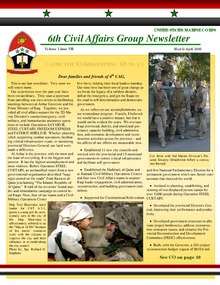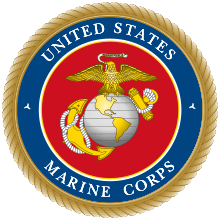6th Civil Affairs Group
6th Civil Affairs Group (6th CAG) was a United States Marine Corps Civil Affairs unit: organized, trained and equipped on Camp Lejeune, North Carolina from April to September 2005; conducted civil-military operations and civil affairs activities in al-Anbar from September 2005 to March 2006; and redeployed and deactivated in the United States from March to April 2006.[2]
| 6th Civil Affairs Group | |
|---|---|
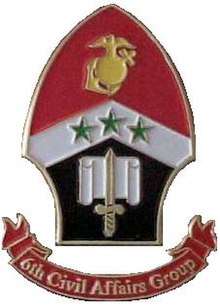 6th CAG insignia[1] | |
| Active | Mar 2005 – Apr 2006 |
| Country | |
| Branch | |
| Type | Civil Affairs |
| Size | Group composed of: * Headquarter and Liaison elements, * 3 regimental CA detachments of a CA headquarters element and 4 battalion CA teams (CATs) * 1 Government Support detachment which included a Governance Support team, a Provincial Civil-Military Operations Center (CMOC) in ar-Ramadi, and 3 regional CMOCs located in al-Fallujah, al-Qa'im, and al-Hadithah. |
| Part of | Multi-National Force West, Multi-National Forces - Iraq |
| Garrison/HQ | Camp Blue Diamond (Sep 2005–Jan 2006) Camp Fallujah (Jan - Mar 2006)) |
| Engagements | Iraq War – Al Anbar campaign * Operation Iraqi Freedom * Operation Sayeed * Operation Steel Curtain * Operation Liberty Express * Operation Doctor * Operation River Gate |
| Commanders | |
| Notable commanders | Col. Paul W. Brier |
At the beginning of 2005, Marine Corps Commandant, General Michael W. Hagee, decided to establish the 5th and 6th CAGs to provide operational and personnel relief to the Corp’s two existing CAGs (3d CAG and 4th CAG), which had been continuously supporting Marine combat and stability operations in Iraq over the preceding three years.[2] The 6th CAG was activated on 1 June 2005, with Col. Paul W. Brier as the Commanding Officer and a cadre of officers and staff NCOs from the 4th Maintenance Battalion, to included its commander, LtCol Helen G. Pratt, as the 6th CAG’s Executive Officer.[3]
The 6th CAG deployed to Iraqi on 11 September and conducted a transfer of authority with the 5th Civil Affairs Group on 21 September.[4]
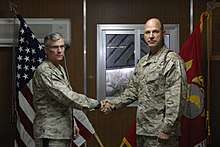
Subsequently, the 6th CAG planned and provided civil affairs support for the command and ground combat elements of the 2nd Marine Division and Multi-National Force West in al-Anbar governate during 2005 and 2006. The Group supported operations including Operation Sayeed, Operation Steel Curtain and Operation Liberty Express. The unit was deactivated in April 2006 upon redeployment to the United States.[5]
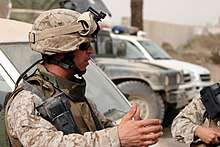
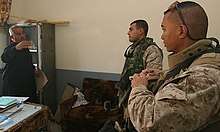
Mission
6th CAG's mission: "Plan and execute civil military operations in support the command and ground combat elements of the 2nd Marine Division and Multi-National Force West during Operation Iraqi Freedom, while serving as the liaison between military forces and civil authorities, the local population and non-governmental organizations. Conduct activities which enhance the relationship between the military and Iraqi personnel and organizations facilitated through application of civil affairs specialty skills in areas normally the responsibility of civil governments. Provide guidance in civil administration, economic development, heath, education, infrastructure restoration, and reconstruction."
Unit awards
A unit citation or commendation is an award bestowed upon an organization for the action cited. Members of the unit who participated in said actions are allowed to wear on their uniforms the awarded unit citation. The 6th Civil Affairs Group has been presented with the following awards:
| Streamer | Award | Year(s) | Additional Info |
|---|---|---|---|
| Navy Unit Commendation Streamer | 28 Feb 2006 - 9 Feb 2007 SU I MEF (FWD) | Al Anbar Campaign | |
| Navy Unit Commendation Streamer | 1 Sep 2005 - 28 Feb 2006 SU II MEF (FWD) | Al Anbar Campaign | |
| National Defense Service Streamer | 11 Sep 2001 - | Global War on Terrorism | |
| Iraq Campaign Streamer | Phase 3, Iraq Governance | Iraq War | |
| Iraq Campaign Streamer | Phase 4, National Resolution | Iraq War | |
| Global War on Terrorism Service Streamer | 11 Sep 2001 - | Iraq War | |
See also
Notes
- The 6th Civil Affairs Group’s organizational emblem was intended to reflect the mission which caused its creation during Operation Iraqi Freedom. The 2d Marine Division Spearhead was adopted as its basic shape because the 6th CAG would operate under its tactical control. The red, white with three green stars, and black bands, angled toward the tip of the spear conveying forward progress, was derived from the Iraqi National flag, both identifying the country in which the Group would operate and symbolizing the government it sought to build and strengthen. The gold eagle, globe and anchor outline on a red field shows that the Group is a USMC unit and is reminiscent of the Command’s guidon, further alluding to the CAG’s provisional nature, as provisional units which do not rate organizational colors. Finally, the scroll and sword depict the civil and military aspects of the Group's mission and are adapted from the US Army Civil Affairs insignia of branch. Upright and unsheathed, the sword reflects the unit primary mission of supporting the Division’s counterinsurgency operations as well as the military support necessary to re-establishing civil government. Partially unrolled, the parchment scroll shows the beginning of democratic government based on laws and allude to the Constitutional referendum and the election of a permanent national government that occurred during the Group’s tour in Iraq.
- Estes, Kenneth W. (2011). Into the Fray: U.S. Marines in Iraq, 2004-2005 (PDF). U.S. Marines in the Global War on Terrorism. United States Marine Corps History Division, Marine Corps University. pp. 131–134. Retrieved 13 May 2010.
- Estes, Kenneth W. (2011). Into the Fray: U.S. Marines in Iraq, 2004-2005 (PDF). U.S. Marines in the Global War on Terrorism. United States Marine Corps History Division, Marine Corps University. pp. 131, 161. Retrieved 13 May 2010.
- Acosta, Jeffrey; Decker, Ray; Saunders, Greer (2007). "Field History: A History of the 6th Civil Affairs Group" (PDF). Fortitudine. Vol. 32 no. 4. United States Marine Corps History Division, Marine Corps University. p. 11. Retrieved 13 May 2010.
- Acosta, Jeffrey; Decker, Ray; Saunders, Greer (2007). "Field History: A History of the 6th Civil Affairs Group" (PDF). Fortitudine. Vol. 32 no. 4. United States Marine Corps History Division, Marine Corps University. pp. 11–12. Retrieved 13 May 2010.
References
Web
- "What is Civil Affairs?". The Civil Affairs Association. Retrieved 13 May 2020.
- "Civil Affairs continues making a positive difference". Hi-Desert Star. Retrieved 14 May 2020.
- "Navy Physician Heading to Iraq with Marine Corps Civil Affairs Group". Navy News Services. Retrieved 14 May 2020.
